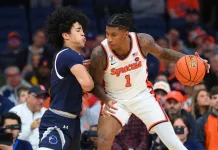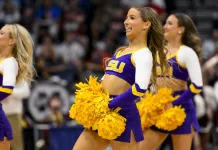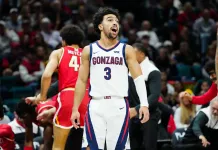Missouri Valley
Life as a mid-major has never been easy in college basketball, but it has gotten so much more difficult in recent years. The ease of transferring and the NIL mean players are being poached at a higher rate and the sharks are circling almost endlessly. Accomplished coaches are also on the move frequently and it isn’t always easy to get a comparable replacement.
Those themes are very much present in the Missouri Valley this season. Former Indiana State head coach Josh Schertz is now at Saint Louis and took star Robbie Avila with him. Former Drake head coach Darian DeVries is now at West Virginia and took his son, Tucker, with him. Senior guard Atin Wright took his free transfer opportunity with the coach leaving and went to North Texas. Belmont’s trio of sophomore standouts – Ja’Kobi Gillespie (Maryland), Cade Tyson (North Carolina), and Malik Dia (Ole Miss) – all moved to major programs. Bradley standout Connor Hickman transferred to Cincinnati.
There are a lot of good offensive teams on an annual basis. Per Bart Torvik, this was the top conference in Effective Field Goal Percentage offense at 52.1%, narrowly edging out the Ivy League. This was also a good defensive conference last season, due in large part to how the league is called. Fouls are not called often. Teams take a ton of 3s (39.7% 3P Rate ranked sixth) and mid-range jumpers. They don’t get to the rim and typically don’t have great size, so there aren’t a lot of offensive rebounds or free throw attempts.
Sadly, the storylines for this conference are about who is no longer there as opposed to who stuck around or transferred in. As a result, the ceiling for the Missouri Valley has been dramatically lowered. A team or two will undoubtedly emerge, but Indiana State, Drake, and Bradley were all top-60 teams per Bart Torvik and top-65 teams by KenPom at season’s end. Bradley is the only preseason top-100 team for Torvik and KenPom entering the season.
Belmont Bruins
As mentioned in the conference overview, Belmont’s losses are substantial. Malik Dia led the nation in Usage Rate, while Ja’Kobi Gillespie was a 66% 2-point shooter and a 39% 3-point shooter. Gillespie was also fifth in the conference in assists per game. Cade Tyson was a 47% 3-point shooter. Furthermore, Keishawn Davidson and Jayce Willingham are no longer on the team, so each of Belmont’s five most productive scorers are not on the roster.
Casey Alexander is a good head coach, but his string of eight straight 20-win seasons is in jeopardy. His teams have also won at least 10 games in league play every one of those years. He did bring some good transfers to Nashville and some good 2-point shooters, but last year’s team shot 37.2% from 3 and he doesn’t have those kinds of shooters this season. The offense will have to change for a team that took a 3-pointer 42% of the time last season, unless Alexander feels confident in his offense getting the newcomers open looks and knocking them down.
Bradley Braves
The Braves enter this season as the conference favorite, simply because they did better with the war of attrition than most everybody else did. Head coach Brian Wardle is back for his 10th season. He had arguably his best team last season, even though the 2022-23 team had a better record. Wardle’s crew was in the top 30 in 2P% and 3P% offense. They were also 28th in 2P% defense.
I’m not sure I’d bet on similar offensive metrics this season. The Braves took 568 Close Twos as defined by Bart Torvik and 560 Far Twos, so basically mid-range jumpers. Those are typically lower-percentage attempts. They also took 802 3-pointers, but lost a 41% shooter in Connor Hickman. Duke Deen is back and he was a 39% shooter and also the facilitator of the offense. The loss of leader Malevy Leons is big, as he led the team in rebounding and blocks, but more playing time is coming for 7-foot-1 center Ahmet Jonovic.
Drake Bulldogs
Drake will look a lot different this season, as Darian DeVries has taken his talents, and his son, to Morgantown. DeVries led the Bulldogs to four straight top-100 seasons and back-to-back NCAA Tournament appearances. He won at least 20 games in every season. He should thrive at West Virginia, but what about the team he left behind?
Ben McCollum inherits a blank canvas after 15 seasons at Northwest Missouri State, where he won four Division II National Championships and was a 12-time MIAA regular season champion. With a record of 394-91, it is hard to believe that it took so long for him to make the leap to Division I. McCollum brought four players from NW Missouri State with him to help fill out the roster and also hit the portal hard. Last year’s Bulldogs went 4-1 in Quadrant 1 games and ranked in the top 40 in 3P%, top 30 in 2P%, and top 50 in FT%. Those are some big shoes to fill.
Evansville Aces
One of the wildly underappreciated coaching jobs in the country last season came from David Ragland. Evansville went 5-27 in his first season and just 1-19 in league play, but the Aces improved by 12 wins last season. The Aces won 24 games total in Todd Lickliter’s three seasons before Ragland took over. The same problem areas Evansville always contends with were there, as this wasn’t a very good offensive team, but the team was light years better on defense.
Evansville was 342nd per Bart Torvik in adjusted offensive efficiency during the 2021-22 season under Lickliter and 359th in Ragland’s first year. They improved by over 100 spots, but the defense really stood out. Also, by accepting an invitation to play in the CBI, the Aces, who went 16 days between games, got a lot of valuable practice time. Unfortunately, leading scorer and best player Ben Humrichous transferred to Illinois and big man Yacine Toumi went to Seton Hall, so it’s tough to see another year of improvement.
Illinois Chicago Flames
Life in the Missouri Valley has not gone well for UIC. They’ve had two seasons in the conference and have gone 4-16 in league play both years, posting a 24-41 overall record. Luke Yaklich did not work out, so we have a coaching change here with Rob Ehsan taking over. Ehsan was the head coach at UAB before Billy Kennedy and had a couple of 20-win seasons, but didn’t have the Blazers at their current level of expectations. He’s spent the last four seasons as an assistant at Stanford.
This, like so many teams, will be a roster made up of transfers. Filip Skobalj is the top returnee after scoring 8.2 points per game. Modestas Kancleris was a good scorer at Cal State Bakersfield and Tyem Freeman shot 47% on 3s at Toledo in limited minutes. Ehsan has been attached to Jerod Haase a lot and Haase, who was fired from Stanford, typically has teams that shoot well from 3, but struggle to take care of the ball.
Illinois State Redbirds
Ryan Pedon paid his dues as an assistant at Miami (OH), Toledo, Illinois, Butler, and Ohio State before getting a crack at Illinois State. In Year 1, Pedon had more conference wins than the team had in the previous three seasons. In Year 2, he led the Redbirds to a four-win improvement overall and a three-win improvement in conference. The team improved in all facets of the game except for 3-point shooting, but that is precisely what Pedon went after in the portal.
He pulled a really good player from the Summit League in Boden Skunberg, who was a pretty average 3-point shooter last season, but a guy who might benefit from more of a supporting cast. He shot 39% from 3 the previous season. Landon Wolf shot 43% from 3 in limited minutes for rival Northern Iowa. Sophomore Johnny Kinzinger is a year older and wiser and shot 40% from 3 last season as his playing time increased late in the year. This is my MVC dark horse.
Indiana State Sycamores
What a story Indiana State was last season. The Sycamores deserved a better NCAA Tournament fate, but didn’t let the snub get to them. After winning 32 games and losing to Drake in the MVC Tournament final, the Sycamores went to the NIT and made the finals, beating SMU, Minnesota, Cincinnati, and Utah before losing by a bucket to Seton Hall. The story will not be as compelling this season.
Head coach Josh Schertz is now at Saint Louis and Robbie Avila went with him. The entire starting five left, so new head coach Matthew Graves is starting from scratch. Graves was promoted internally and will have a team full of transfers. Double-digit scorers Samage Teel and Markus Harding come in from Presbyterian and Central Michigan, respectively, and Jahni Summers is a JUCO transfer, so this is a step up in class conference-wise for them. Not much will change with how Indiana State plays, but the talent disparity from last season is the largest in the league.
Missouri State Bears
After a couple-year hiatus, Cuonzo Martin is back in the coaching ranks as he takes over at Missouri State. This is his second stint with the Bears, as he was there from 2008-11. Dana Ford only had a losing record once in six seasons, but that wasn’t enough and he was let go. All five starters from last season are gone and the program is in a state of flux with a move to Conference USA on the horizon.
Martin has been a very good recruiter throughout his career, securing all kinds of good freshmen to Cal, Missouri, and Tennessee, but he doesn’t have the resources or the brand now. His chief transfers in the portal are from Morgan State, IU Indianapolis, Austin Peay, and Delaware State. Some decent players, especially Wesley Oba, but it looks like a rebuilding year where the primary focus will be playing defense.
Murray State Racers
This was a better team than the 9-20 record would indicate last season. The Racers were 2-10 in games decided by six or fewer points. Murray State only shot 56.3% on Close Twos as defined by Bart Torvik, meaning shots at the rim like layups, dunks, and anything inside a few feet. JaCobi Wood (51.3%) and Quincy Anderson (49%) were the biggest culprits given their usage. Anderson is gone, but Wood is back. The tough part is that Anderson was the team’s best 3-point shooter at 39% and there were only two guys better than 33%.
The other was Wood, so he’ll be the leader here. To fix the problem at the rim, Kylen Milton from Austin Peay (54%) and AJ Ferguson (58.3%) from Southern Illinois are now on the roster. Murray State was 62nd in shot share on Close Twos and ranked 293rd in 3P%, so some improvements in those two areas could make this team a contender. A lot of positive regression seems to be on their side if the newcomers live up to their potential.
Northern Iowa Panthers
Come hell or high water, Ben Jacobsen is going to have a solid basketball team. The records aren’t always there for Northern Iowa, as their slower style of play often condenses games and tightens them up, although the Panthers have played a bit faster in recent seasons. We’ll see what they have in store for this season, as they really need to get better on defense.
Over the last four seasons, the Panthers have been 273rd or worse in eFG% defense. It’s the Missouri Valley. Teams make shots. But, still. They haven’t had elite offenses in three of those four seasons to close the gap. No matter what, you’re going to get one of the best defensive rebounding teams in the nation, but also one of the worst offensive rebounding teams out of UNI. In terms of continuity, the Panthers did keep a trio of solid players that started, but depth will be a huge worry this season.
Southern Illinois Salukis
One of the more interesting coaching moves in the Missouri Valley involved Southern Illinois. They fired former standout player Bryan Mullins and brought in Scott Nagy, who was willing to leave Wright State after eight seasons. Wright State was perennially solid under his watch, including a couple of NCAA Tournament appearances. They were often terrific on the offensive glass and also played at a heightened pace. If Nagy wants to run here in Carbondale, it will be a tremendous departure from the team under Mullins.
The Salukis were 335th per Bart Torvik in adjusted tempo last season and never higher than 273rd during Mullins’ tenure. Wright State was 293rd back in 2019, but has been in the top 25 twice, top 35 three times, top 50 four times, and top 100 in every season since. So, this is a team that is likely to push the pace more. Nagy’s Raiders were fifth in the nation in 2P% last season. The roster is full of transfers and, surprisingly, none from Wright State. But Kennard Davis, the second highest-ranked recruit under Mullins did stick around, so we’ll see how Nagy uses him.
Valparaiso Beacons
Valpo has fallen on really hard times and the program seemed to bottom out in Year 1 under Roger Powell Jr. The team went 7-25 last season and just 3-17 in MVC play. Since joining the Mo Valley, Valpo has not had a winning season in conference play and one winning season overall. Last year’s team was 331st in eFG% offense and 348th in eFG% defense, so they were awful on both ends of the floor. They also had one of the lowest free throw rates in the nation, so they didn’t get to the rim enough.
Surprisingly, Cooper Schwieger, who thrived as a freshman, stuck around. So did leading scorer Isaiah Stafford, who had 16.9 PPG, but that was a byproduct of volume and not efficiency. Those two combined for over 44% of the team’s nightly offensive output. Leading passer Darius DeAveiro stayed, too. Credit to Valpo for getting kids that have bought into the program. Maybe that will lead to some improvement.






